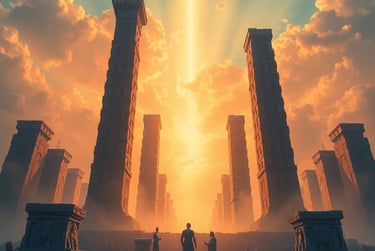The Six Limbs of the Vedas & Kali Yuga, the Times we live in
TheVedicSite(c) 2024


The six limbs of the Vedas are auxiliary disciplines that help in understanding, interpreting and applying the knowledge contained in the Vedas.
They are:-
1. Shiksha (Phonetics): The study of pronunciation, accent and enunciation of Vedic mantras. It deals with the sounds and syllables of Vedic recitation.
2. Chhandas (Meter): The study of various meters or rhythmic patterns used in Vedic hymns.
3. Vyakarana (Grammar): The study of the rules of grammar and syntax that help in understanding the structure and meanings of Vedic language.
4. Nirukta (Etymology) : The study of meanings of words, especially those whose meanings are obscure or archaic. It involves explaining the origin and significance of words used in Vedic texts.
5. Kalpa (Rituals): The study of the rules and procedures for performing Vedic rituals and sacrifices.
6. Jyotish (Astronomy/Astrology/Calendar): The study of astronomy and astrology, which is used to determine the correct times for rituals and sacrifices. It includes the understanding of the movement of celestial bodies and their influence on the natural world.
We as a collective whole are no longer able to master the six limbs of the Vedas the way it was intended because according to the Vedas we are currently in Kali Yuga. Kali Yuga is the fourth and final age in the Vedic cycles of time known as Yugas.
The Yugas are a series of four ages (Satya Yuga, Treta Yuga, Dvapara Yuga and Kali Yuga) each characterized by a decline in virtue, dharma (righteousness) and spiritual wisdom.
Kali Yuga is described as the most degenerate of the Yugas, marked by widespread moral decline, corruption and general departure from spiritual values. Some of the features of Kali Yuga are:-
1, Time Period: Kali Yuga is believed to last for 432000 years, with estimates suggesting it began around 5000 years ago when the last Avatar Krishna left this Earth.
2. Decline in Virtue: People in Kali Yuga are said to be more driven by material desires and self interest, wisdom is diminished, and there is less emphasis on truth, justice and compassion. Dharma (righteousness) is said to have diminished to a small fraction of its original strength.
3. Spiritual Decline: Spirituality and religious practices are said to be at their lowest during Kali Yuga, with the majority of people being far removed from Divine or true knowledge. The pursuit of individual pleasure and greed tends to be dominant.
4. Moral Decay: The qualities of virtue like honesty, compassion and integrity are greatly diminished. People are more argumentative, dishonest and indulgent in vices such as greed, anger and lust.
5. Shortened Lifespans and Weakening of Physical Power: In Kali Yuga, the human lifespan is much shorter and physical strength, vitality and health are reduced.
6. Role of Divine: Despite the overall decline Kali Yuga offers tremendous opportunities for redemption. The concept of Bhakti (devotion)is emphasized. Even in this age of darkness individuals can achieve liberation through sincere devotion to God particularly through chanting God's name and other methods of worship.
Whilst our intelligence and capabilities are limited in Kali Yuga, we can still praise and worship God with sincerity, faith and dedication.
Sage Parashar says: "Kaliyug is the mine of faults, but it has only one great virtue – that the people will acquire divine position only by reciting Lord’s name. Recitation of Lord’s name, regardless of intention and motivation– whether it is love, derision, laziness or maliceness- would destroy one’s sins."
"The Paramgati (supreme salvation) that people could receive by ten thousand years of meditation in Satayug; by performing Yagya for hundred years in Tretayug and by worshipping Lord’s idol for ten years in Dwapar, that supreme salvation is easily available for people in Kaliyug simply by reciting Lord’s name for one day and one night continuously. But still, in Kaliyug people would not have faith in Lord’s name. It is their misfortune.” (VISHNU PURANA)
In the Vedic scriptures the best means of deliverance in Kali Yuga is to “recite the Holy Name of the Lord”, a transcendental vibration which allows peace and compassion to flow within one’s being, and helps the mass consciousness evolve to a higher level. One can no longer perform complicated Vedic sacrifices according to their proper manner, because knowledge and action have deteriorated to such an extent. But one can still recite the Holy Name of the Lord, not just for oneself, but out of compassion for all of Humanity, Mother Earth and Beyond.


